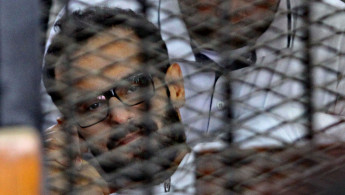Mohammad Sultan's long battle for justice
Mohammed Sultan has been on hunger strike for over 400 days.
This strike is a direct result, he said during his trials in Egyptian courts, and in protest at the different forms of torture he has been subjected to during his detention.
"I do not know why young people are treated with such violence and injustice. This will only generate more violence. I would like to point out that these young people are the future of this nation, and I am in prison due to the country’s political situation," Sultan said.
Sultan is accused of being involved in the so-called "Rabaa operations room", a suspected clandestine organisation of 50 Muslim Brotherhood members, including the general leader Mohammad Badie, who authorities say have been directing "terrorist" activities in Egypt.
"The most difficult choice I had to make was between freedom and my Egyptian citizenship. They offered me immediate release if I renounced my Egyptian citizenship, which I would never do, even if I have to spend the rest of my life in prison."
| The most difficult choice I had to make was between freedom and my Egyptian citizenship. - Mohammed Sultan |
Sultan, 26, holds both Egyptian and US citizenship. He is the son of Salah Sultan, former secretary general of Egypt’s supreme council for Islamic affairs, who is also in prison.
Mohammad received his a degree in economic sciences from Ohio State University, before working as a director for institutional development at a petroleum company.
He returned to Egypt during the 25 January revolution in 2011 and joined thousands of young Egyptians to free the country from authoritarianism.
He also took part in the Rabaa al-Adaweya protest, when he was shot in the arm during the security forces' brutal dispersal of a sit-in in Cairo in the summer of 2013. Nearly 1,000 people were killed.
Just over a week later, he was arrested in his home, when Egyptian police stormed in looking for his father.
An arrest warrant was issued two days later, and he was taken to five different jails and police stations during the investigation. He says he was repeatedly blindfolded and tortured.
The court adjourned the trial session on 16 March so that attorneys could resume the defence case.
The defendants had been accused of setting up an operations room to manage the Muslim Brotherhood "confrontations" against the state, following the massacre at Rabaa al-Adaweya.
Now, 400 days into his hunger strike, he is making the most direct challenge to the Egyptian regime. It could ultimately cost him is life.
This article is an edited translation from our Arabic edition.



